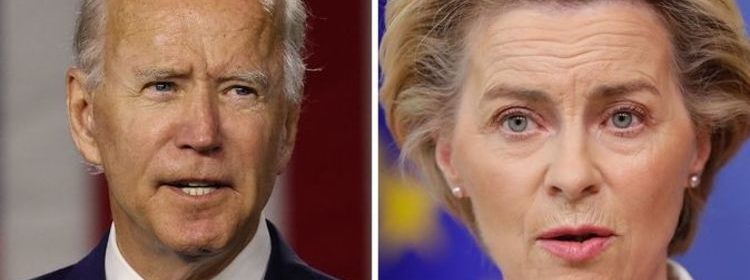EU vaccine humiliation: Bloc ‘wanted to be reborn’ to show US’ failings over pandemic

Laura Kuenssberg on how EU vaccine plans may 'affect' UK
When you subscribe we will use the information you provide to send you these newsletters.Sometimes they’ll include recommendations for other related newsletters or services we offer.Our Privacy Notice explains more about how we use your data, and your rights.You can unsubscribe at any time.
Infighting inside Brussels has escalated dramatically in the past month, and European Commission President Ursula von der Leyen now faces the sternest test of her leadership in uniting the bloc. Leaders from the EU, as well as US President Joe Biden, are set to review the bloc’s handling of its vaccine rollout, which has been plagued by a range of issues since January. Calls have been made for the EU to place an export ban on bloc-made vaccine doses leaving member states, despite various demands this threat is taken off the negotiating table.
It comes as the EU’s jab plan continues to falter, with companies failing to deliver the proposed number of vaccines the likes of Ms von der Leyen had initially requested.
But before a host of vaccines had been produced, and utilised effectively by nations such as the UK, US and Israel, leaders within the bloc had hoped Brussels could be “rebooted” after the coronavirus pandemic and show the world how to function as a collective.
At the time, the EU “boasted” that it was working together to create a clear path to support member nations, something the US, and its states, was unable to do.
The BBC’s Europe editor, Katya Adler, said that they wanted to demonstrate this by helping nations struggling with the pandemic, namely Italy and Spain, with the coronavirus recovery fund.
They also claimed that “EU members have been sharing protective medical equipment”, with Berlin originally claiming it had treated patients from other member states to the tune of €20million (£17.2m) from the Germany taxpayer.
And although they were unable to agree on a uniform rollout of lockdowns across all member states, the EU made the move to ensure it had enough prior warning from nations over its plans, that the bloc should be able to suitably control the virus.
It implemented reported case targets that had to be met, in order for restrictions to be lifted.
Over in the US, it was unable to agree such terms, with states free to control how they handled the outbreak.
JUST IN: VDL ordered to use draconian powers to seize jabs and factories
They didn’t initially want to commit to use huge finances to bail other countries out.
It led to a rise in euroscepticism within the bloc, and Ms Adler likened it to when “there were calls all over the EU” for countries to leave in the aftermath of the 2008 financial crisis.
She added: “This time it’s different. Eurosceptic politicians haven’t gone away. Plenty of voters are still critical of Brussels.
“But the call to leave the EU altogether has broadly fallen silent.
“EU relations are messy and further complicated by national politics but most EU leaders think the COVID-19 programmes they’ve got up and running together, are better than those they’d have achieved alone.”
Despite the bloc’s efforts, it has been inundated with problems throughout its jab rollout, and has fallen well behind rivals such as the US and UK when it comes to vaccinating citizens.
DON’T MISS:
Von der Leyen’s army used broomsticks instead of guns [INSIGHT]
EU crisis: Ursula von der Leyen ‘watching power slip away’ [ANALYSIS]
EU ordered to back off on AstraZeneca to focus on ‘cooperation’ [UPDATE]
The latest figures show that the UK has administered around 44.7 vaccines per 100 citizens, while the EU lags behind on 12.9 jabs for every 100.
Alongside this poor showing, the likes of French President Emmanuel Macron have also faced severe criticism.
He claimed the AstraZeneca jab was “quasi-ineffective” among those aged about 65 years old, hours before EU bodies confirmed it was safe to be rolled out across the bloc, leading some to believe he was responsible for a section of citizens refusing to take the jab.
And the bloc had previously vowed to spend huge amounts on helping fund a vaccine, yet once again it was left behind the UK and US.
According to a report by scientific data company Airfinity, the UK spent £25 per person on early COVID-19 research, committing around £1.67billion to vaccines before knowing their effectiveness.
The US offered £7.9billion, at a rate of £24.02 per person, while the EU lagged behind again, spending just £3.51 per citizen, with an investment of £1.57billion.
This evening, EU leaders will once again virtually meet, and former Belgian Prime Minister Charles Michel hopes it will help “rebuild” the transatlantic alliance with the US.
Writing on Twitter, Mr Michel – who chairs EU summits in his role as European Council President – said that he had invited Mr Biden along to the conference to offer him the chance to “share his views on our future cooperation”.
Among the main talking points will be whether the EU decides to block exports on vaccines.
Reports show that there is a lack of vaccines being exported from the UK to the EU, compared with around 10 million that have gone the other way.
EU leaders are likely, therefore, to ask how they can force “reciprocity” on vaccine supply.
Source: Read Full Article





